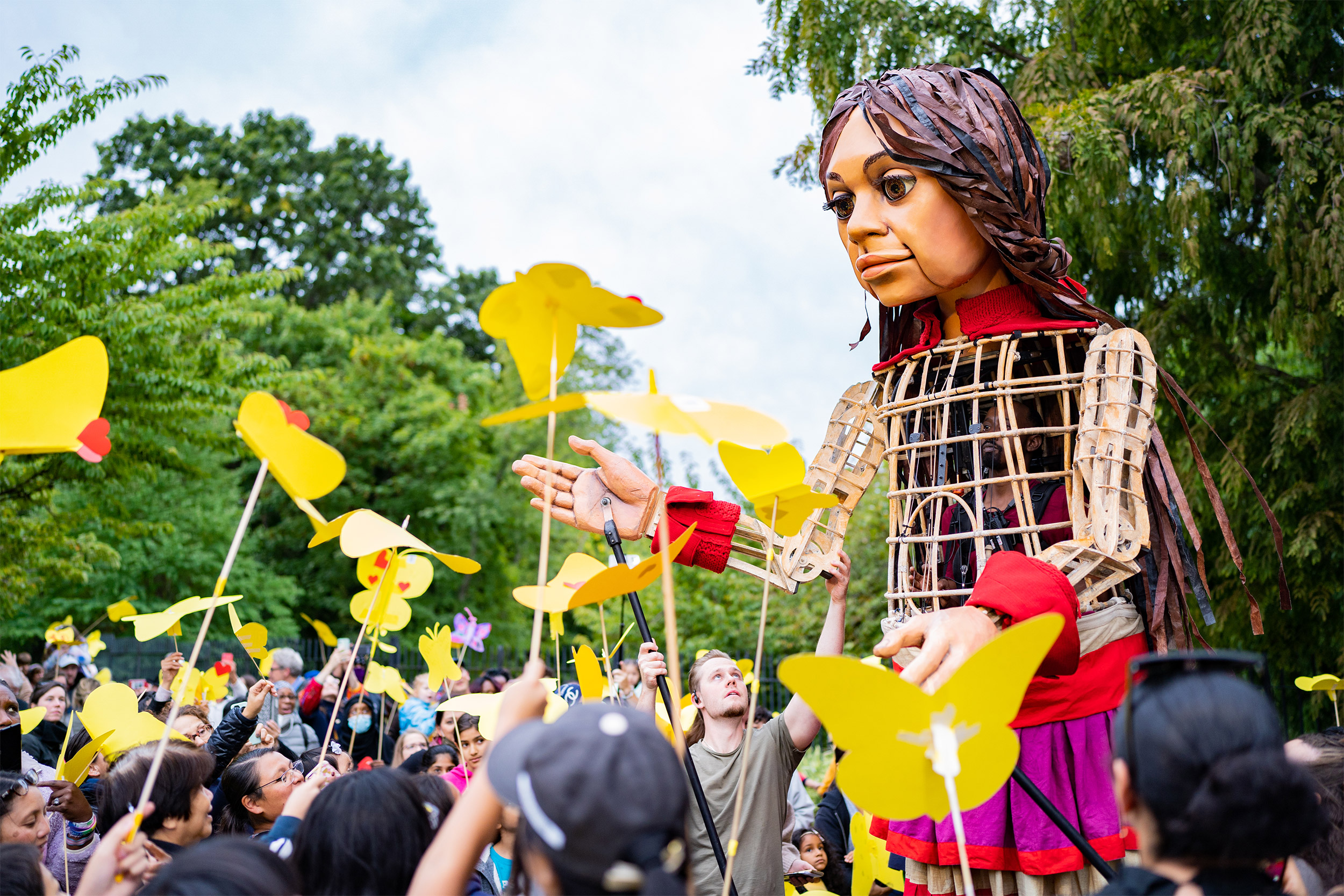
Little Amal will be making a stop in Harvard Yard on Thursday evening as part of the 12-foot-tall puppet’s global pilgrimage.
Credit: The Walk Productions, Respective Collective ©
Big impact of Little Amal
A.R.T., ArtsThursdays event centers on 12-foot puppet of Syrian refugee child, kicks off monthlong arts programming on migration, immigration
At 12 feet tall, Little Amal is hard to miss. But the towering puppet, who represents a 10-year-old Syrian refugee searching for her mother, has already had an outsized impact on people worldwide as she carries a message of hope for marginalized people everywhere.
Little Amal (her name means “hope” in Arabic) will make an appearance at the Science Center Plaza on Thursday at 7 p.m. for “Finding Friends in Harvard Yard.” It is the latest stop in a global trek that has already taken the puppet and her three operators to 13 countries.
The free public event is created by the American Repertory Theater (A.R.T.) and sponsored by ArtsThursdays, a University-wide initiative supported by Harvard University Committee on the Arts (HUCA).
“Little Amal is a perfect example of the free and accessible programming made possible by ArtsThursdays,” said Lori Gross, associate provost for arts and culture. “By bringing together creative practitioners from all areas of Harvard in collaboration with visiting artists, ArtsThursdays highlights weekly artistic experiences for the public.”
The event to welcome Little Amal, and the Harvard activities surrounding her appearance, are one such example, serving as the kickoff to a monthlong focus on migration and immigration for ArtsThursdays.
Other events in September include a screening of the film “Bravo, Burkina!,” followed by a discussion with filmmaker Walé Oyéjidé, and a performance of Syrian-Armenian artist Sona Tatoyan’s multimedia puppet piece, “Azad,” which means “free” in Armenian.
“Finding Friends in Harvard Yard” caps the events surrounding Amal’s visit to the Cambridge-Boston area, the first stop on her nine-week U.S. tour. Her full slate of activities in Boston through Saturday includes a meeting with local kindergarteners and a Red Sox game, where she will throw out the first pitch.
Director Brisa Areli Muñoz was commissioned by HUCA and the A.R.T. to build intergenerational workshops around Little Amal’s visit, which were held in local libraries and the Harvard Ed Portal in Allston in August. These experiences have given Muñoz a unique insight into Little Amal and her effect on the community — and the promise of similar events.
All are geared, said Muñoz, “to help the community be a part of the process of imagining what it might mean to welcome them all, and what must we understand about ourselves so that we can show up to this conversation and this experience.”
On Thursday, all are encouraged to show up at 6 p.m. In addition to enjoying the food trucks that will be gathered on the plaza, said Muñoz, this extra time will allow participants to learn more about the international refugee crisis and “to be reflective about who Amal is and what she represents, so that when we meet her, we can greet her with the care and respect that she deserves.”
“The Little Amal project has catalyzed relationships in conversations between the A.R.T. and parts of Harvard,” said Diane Paulus, the Terrie and Bradley Bloom Artistic Director of the American Repertory Theater. “The heart of art in making theater is collaboration. It’s interdisciplinary. At its core, theater is music; it’s ritual; it’s embodied presence; it’s community; it’s transformation. My strong hope is that as a community we see the work that is alive on our campus every Thursday not as a nice-to-have pastime, but rather a central driver of how we wrestle, reckon, debate, and celebrate the most pressing issues of our time.”
“Little Amal represents displaced people all across the globe,” said Muñoz. “Art is a beautiful provocation, a tool for collective understanding, for mutual understanding. This project allows an entire community to welcome this young girl who is a beacon of hope to understand this crisis more deeply.”




